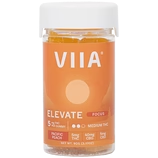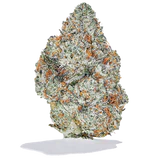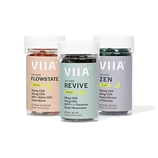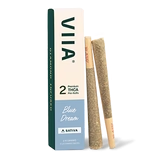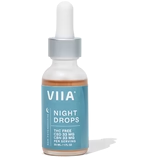 uncategorized
uncategorizedWhat Is MCT Oil? Why Is It In My CBD Oil?
MCT oil is a type of oil derived from coconut oil or palm oil. Unlike other plant-based oils, MCT oil is composed of medium-chain fatty acids, which the body can easily convert into ketones and use for energy. Because of this, it's become a popular health supplement for athletes and those with weight loss goals.
You may have also encountered MCT oil as a supporting ingredient in your CBD products. CBD is rarely sold on its own. In fact, it's usually best when combined with fat to improve absorption and for easier dosing.
If you're curious about MCT oil and what it's doing in your CBD product, keep reading to learn more.
Article Highlights:
- What does MCT stand for? Medium-chain triglycerides are a type of saturated fatty acid metabolized differently than other saturated fats.
- What is MCT oil made from? MCT oil is made from palm kernel oil or coconut oil.
- Benefits of MCT oil. MCT is absorbed and metabolized quickly by the liver and used for energy, making it less likely to be stored as body fat. It has also been linked with satiety, regulation of body temperature, and improved cognitive function.
- Taking MCT oil with CBD. MCT oil is a practical base for CBD products to improve cannabinoid absorption and dosing.
What Is MCT Oil Made Of?
MCT oil is made of medium-chain triglycerides (MCTs), a type of lipids (fat) found in the blood. The medium-chain shape of these fat molecules makes it easier for the body to digest than long-chain triglycerides found in dairy fats and vegetable oils. MCTs are metabolized differently and can be used readily for energy rather than stored as fat. MCTs are found naturally in coconut oil and palm kernel oil, but they can also be made in a lab.
Most high-quality MCT oil is made through fractionation with virgin coconut oil, which separates the medium-chain triglycerides from the original oil and concentrates it into a clear and odorless oil. It's done by heating the oil and then cooling it, causing the MCT to solidify and separate from the rest of the fat content.
What Is In MCT Oil?
There are four types of MCTs: caprylic acid (C8), capric acid (C10), lauric acid (C12), and capric-caprylic acid blend (CCA). C8 and C10 are the most ketogenic, meaning they are more likely to be used for energy rather than stored as fat, making them a popular supplement for those following a ketogenic diet and targeting weight loss.
So, if you're looking to add an MCT supplement to your diet, which one should you choose?
Well, that depends on your goals. If you're strictly aiming for weight loss, then C8 or C10 is your best bet.
But if you're also interested in other benefits like improving cognitive function or supporting gut health, then C12 or CCA may be a better option. Ultimately, it's up to you to decide what's best for your needs.
What Is Organic MCT Oil?
The quality of the ingredients of your supplements is an essential factor when shopping. Organic MCT oil does not contain chemicals, additives, fillers, and the crops should be grown without harmful chemical pesticides that could make their way into the final product.
A common side-effect of taking low-grade MCT oil is gastrointestinal upset. This is believed to be caused by high lauric acid content. While some lauric acid is a good thing, too much can make the product taste "off," and the gastrointestinal upset may defeat the purpose of taking MCT as a supplement in the first place.
This side effect is usually mild and goes away, but it can be uncomfortable nonetheless. If you experience stomach upset after taking MCT oil, discontinue use.
The best natural ingredient for MCT oil is virgin coconut oil, which is made from the meat of fresh coconuts that are dried and cold-extracted. Unlike refined coconut oils processed at high temperatures, pure coconut oil retains many beneficial compounds in fresh coconuts, such as medium-chain fatty acids, vitamins, minerals, and antioxidants.
Is Palm Oil A Good Source Of MCT Oil?

There's a lot of debate surrounding palm oil—some people say it's unhealthy and unsustainable. Palm oil production has been linked to the deforestation of rainforests, and the chemicals and heavy machinery involved in its production can pollute local waterways. However, companies are working to source palm oil from sustainable plantations.
Palm kernel oil comes from the fruit of the palm tree. It's a plant-based oil high in saturated fat, and it's often used in processed foods and cosmetics as a cheaper alternative to other oils.
It's not necessarily worse for your health than any other oil. And many health experts believe that it doesn't matter whether your MCT oil is derived from palm kernel or coconut, as the priority is to get a blend of C8 and C10 fatty acids.
What's The Difference Between Coconut Oil?
MCT oil and coconut oil are both oils that are derived from coconuts, but they have some key differences. MCT oil is made up of medium-chain triglycerides, a type of saturated fat. Coconut oil, on the other hand, is composed of a mix of saturated and unsaturated fats.
MCT oil is also more concentrated than coconut oil, meaning that it contains more of the healthy fatty acids that can boost your metabolism. Finally, MCT oil is less likely to solidify at room temperature than coconut oil. So, if you're looking for an oil that's more metabolically friendly and less likely to clot in your cupboard, go for MCT oil.
What Are The Reported Health Benefits Of MCT Oil?
Health enthusiasts are always on the lookout for the latest dietary supplement, and right now, that superfood is MCT oil.
Many people notice a difference in how they feel when they consume MCT oil, reporting benefits like increased energy, improved mental clarity, and weight loss.
But is there any scientific evidence to support these claims? Let's take a closer look.
MCT Oil May Support Weight Loss
The verdict is still out on whether or not MCT coconut oil truly supports fat loss, but some convincing studies make for a decent argument for its use to promote weight loss as a supplement.
Medium-chain triglycerides are metabolized differently than other fats.
One study observed subjects receiving parenteral nutrition (intravenous administration of nutrition). The randomly assigned MCT group had improvements in their ketone and insulin levels with improved weight loss compared to the group given long-chain triglycerides [1].
Another study observed that supplementing MCT oil improved feelings of satiety, meaning that participants who consumed two teaspoons of MCT oil at breakfast ate less food at lunch than the participants who ate regular coconut oil or vegetable oil [2].
It should be noted that only consuming MCT oil isn't going to magically promote weight loss on its own. Many other lifestyle factors are involved with making the most of MCT oil. A popular one is a ketogenic diet, which leads us to our next point.
Medium Chain Triglyceride Diet As An Energy Source
A ketogenic diet is a high-fat, low-carbohydrate diet that many people have found to help lose weight, sports performance, and inflammatory conditions. The diet works by forcing the body to burn fat for energy instead of carbohydrates. This process is known as entering a state of ketosis.
While the detailed mechanisms of the diet are still being studied, it is thought that the ketogenic diet may help to improve brain function and reduce inflammation. The diet can be challenging to follow, but many resources are available to help people stick with it.
Some people use MCT oil as a ketogenic diet supplement. When you consume MCT oil, it is absorbed and metabolized quickly, making it a great energy source for athletes and people trying to lose weight by consuming fewer calories.
MCT oil can be added to food or beverages, or it can be taken in capsule form. There are many brands of MCT oil on the market, and the quality can vary. Do your research before you purchase any supplement, including MCT oil.
What Is The Purpose Of MCT Oil In CBD Products?
CBD oil is rarely pure CBD. It's often combined with a base oil to "carry" the contents of the active compound—this is called a carrier oil.
The most common types of carrier oil used in CBD products are hemp seed oil and MCT coconut oil.
MCT Oil Improves Gut Absorption Of CBD
Combining hemp extract with a carrier oil aims to improve the cannabinoids' gut absorption.
Cannabinoids are fat-soluble, which means it likes to stick to fat molecules. When taken together, it's much easier for the body to process increasing the amount of CBD that enters the bloodstream.
MCT Oil Improves Ease Of Use Of CBD
CBD is one of many cannabinoids concentrated in the resin glands on hemp flowers. When the CBD is extracted from the plant, it's in the form of a highly concentrated sticky substance that's very difficult to use and measure accurately.
Manufacturers will combine the CBD extract with a carrier oil like MCT oil in various concentrations to create a CBD oil's much more palatable than the natural flavor of hemp extract.
MCT Oil May Preserve The Active Compounds In Hemp
Cannabinoids and terpenes are very sensitive compounds, exposure to UV light and oxygen will begin the degradation of the compounds, making them weaker.
Compared to olive oil as a carrier oil for hemp extracts, MCT oil was found to improve the stability of the compounds for much longer, which is why it's the oil of choice for medical cannabis preparations [3].
Safety & Side Effects Of MCT Oils
While MCT oil is generally considered safe, there are some potential side effects to be aware of.
When taken in large doses, MCT oil can lead to digestive issues like diarrhea, nausea, and vomiting, which is believed to result from high lauric acid intake. It can also cause headaches, dizziness, and fatigue. If you experience any of these side effects, it's best to reduce your dose or stop taking MCT oil.
You don't have to worry about this when taking CBD oil with MCT oil, as you rarely take high volumes of concentrated CBD oil with an MCT base. Typically, you wouldn't take more than 4 ml in a day (depending on the concentration of CBD).
When it comes to using MCT oil as a dietary supplement, you should be aware that it's still high in saturated fats, increasing one's levels of low-density lipoprotein, the type of cholesterol associated with heart disease and stroke.
Final Thoughts: MCT Oil & CBD
So there you have it, everything you need to know about the potential benefits of MCT oil and its purpose in your CBD products.
MCT oil supplements are famous for supporting ketogenic diets and some weight loss goals, but too much of it can be harmful to your digestive system.
When CBD and MCT oil are combined, you get the benefits of adding essential fatty acids to your diet and the relaxing and healing effects of CBD. It's also used to make the dosing of your hemp extracts much more manageable, more precise, and prolongs the shelf life of the active ingredients.
It's essential that when shopping for any wellness products, you look into the quality of all the ingredients to make sure it's responsibly sourced and the manufacturer implements clean practices to ensure no harmful contaminants end up in the final product.
Resources Cited:
- Jiang, Z. M., Zhang, S. Y., Wang, X. R., Yang, N. F., Zhu, Y., & Wilmore, D. (1993). A comparison of medium-chain and long-chain triglycerides in surgical patients. Annals of Surgery, 217(2), 175.Chicago
- Kinsella, R., Maher, T., & Clegg, M. E. (2017). Coconut oil has less satiating properties than medium chain triglyceride oil. Physiology & Behavior, 179, 422-426.
- Ramella, A., Roda, G., Pavlovic, R., Dei Cas, M., Casagni, E., Mosconi, G., ... & Grizzetti, C. (2020). Impact of lipid sources on quality traits of medical cannabis-based oil preparations. Molecules, 25(13), 2986.



